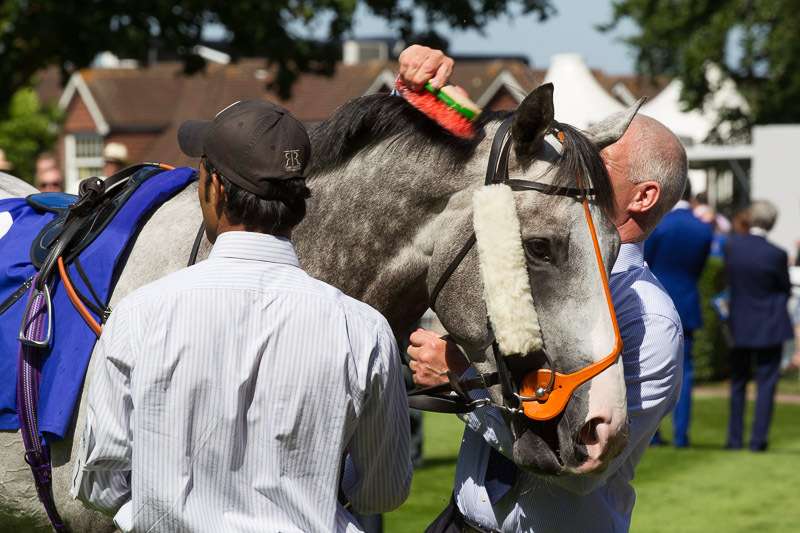© Provided by CBS Sports
Sports betting revolves around placing a wager on the outcome of an upcoming game or event. Bettors attempt to forecast the results and make their best guess on what the outcome will be. Preakness Stakes odds: Gambling on horse racing explained Ah, the Preakness Stakes - one of the most celebrated and anticipated horse racing events of the year. A Single Stakes About is an Any To Come bet consisting of 2 selections taking part in different events, which are combined to produce 2 bets derived from 2 Singles. Any return on each Single, up to the original stake amount, is used to fund a further Single on the other selection. This bet is also known as an Up And Down, a Cross Bet, a Twist, and a Vice Versa.
Ah, the Preakness Stakes -- one of the most celebrated and anticipated horse racing events of the year. This year -- one flipped upside down because of the coronavirus pandemic -- is no different.
Those who don't often participate in betting on the ponies may not understand all the excitement, but it's never too late to get in on the action. If you aren't exactly sure how it all works, don't you worry -- we're here to help you get up to speed. If you don't particularly understand the process or the terminology of betting (we know it can be a bit confusing), we've got you covered with a handy cheat sheet.
An important disclaimer, though: Knowing the terminology doesn't guarantee you success in your wagers. Sometimes, ignorance is bliss ... and profitable.
Anyway, here's a rundown of the terms you'll want to be familiar with:
BET TO WIN: Well, this one is pretty self-explanatory. You're betting on a horse to win the race.
BET TO PLACE: You're betting on a horse to finish either 1st or 2nd in the race.
BET TO SHOW: You're betting on a horse to finish either 1st, 2nd or 3rd in the race.
EXACTA: You're betting on both the 1st and 2nd place finishers in a race.
TRIFECTA: You're betting on the 1st, 2nd and 3rd place finishers in a race.
SUPERFECTA: You're betting on the 1st, 2nd, 3rd, and 4th place finishers in a race.
DAILY DOUBLE: You're betting on the winners of two separate races.
PICK 3: You're betting on the winners of three consecutive races.
PICK 4: You're betting on the winners of four consecutive races.
PICK 5: You're betting on the winners of five consecutive races.
PICK 6: You're betting on the winners of six consecutive races.
Obviously, some of those are more challenging endeavors than others so, as is always the case with gambling, play the odds at your own peril.
Martchup betting explained.(Photo by © Breeders’ Cup/Todd Buchanan 2014)
Horse Matchup betting is simply a wager between two horses in a particular race. Some racebooks offer these on a daily basis at major tracks, but mostly they are available for major horse racing events like the Triple Crown races and the Breeders’ Cup World Thoroughbred Championships.
Instead of handicapping an entire field, it comes down to the handicapper deciding between two horses. Similar to a money line on a sporting event, there is usually a favorite and an underdog.
An example would be horse matchup betting that was available for the 2006 Breeders’ Cup Classic. Bettors could decide between backing Bernardini at -125 or go with the underdog Invasor at +105.
In this wager a bettor would have to put up $125 to collect $225 backing Bernardini. Or going with the underdog, a bettor could back Invasor, putting up $100 to collect $205 for a win.
Of course, to win your wager your horse actually does not have to win the race. The horse you backed just needs to finish in front of the other horse in the Matchup wager. Your horse could finish sixth, and as long as the other runner finished seventh or worse, you cash your wager.

Betting Stakes Explained Game

Betting Odds Explained 15/8
Get a Sign Up Bonus Up To $250 at TVG!
Matchup wagers can be utilized by horseplayers when they have a strong opinion for a particular horse or a strong opinion against another horse.
An astute handicapper can take advantage of pace scenarios that might put one of the two at a big disadvantage. While the race may not set up for your choice to win the race, you might find a situation where your choice has a decided edge over the opponent in the Matchup.
For instance, you might side with a closer while the opponent you are trying to beat is a speed horse in a race loaded with early speed. While the speed horse is dueled into submission and fades, your choice rallies up to pass the tired foe late. Your horse does not have to win the race. As long as your choice gets by the opponent in the Matchup, you cash your ticket!
Betting Stakes Explained Entries
Horse Racing Betting Explained